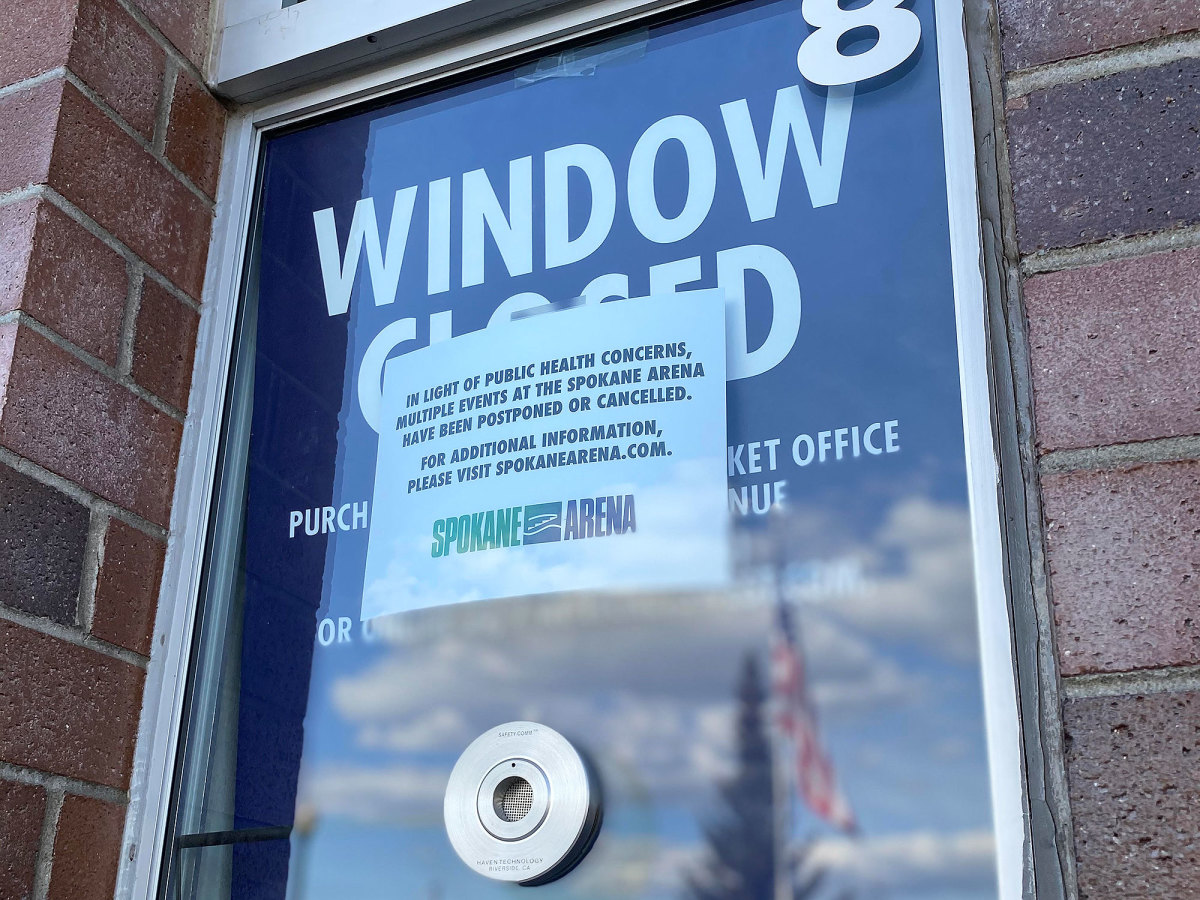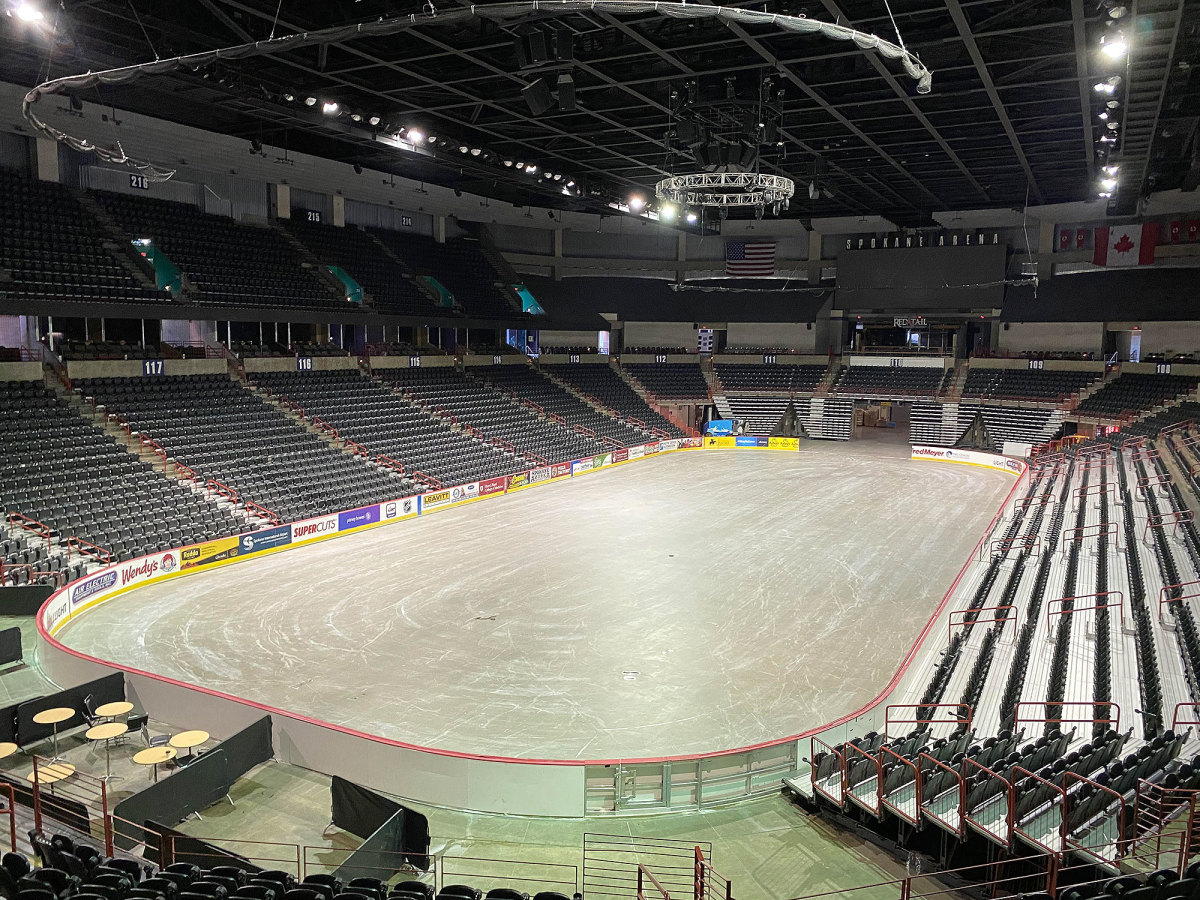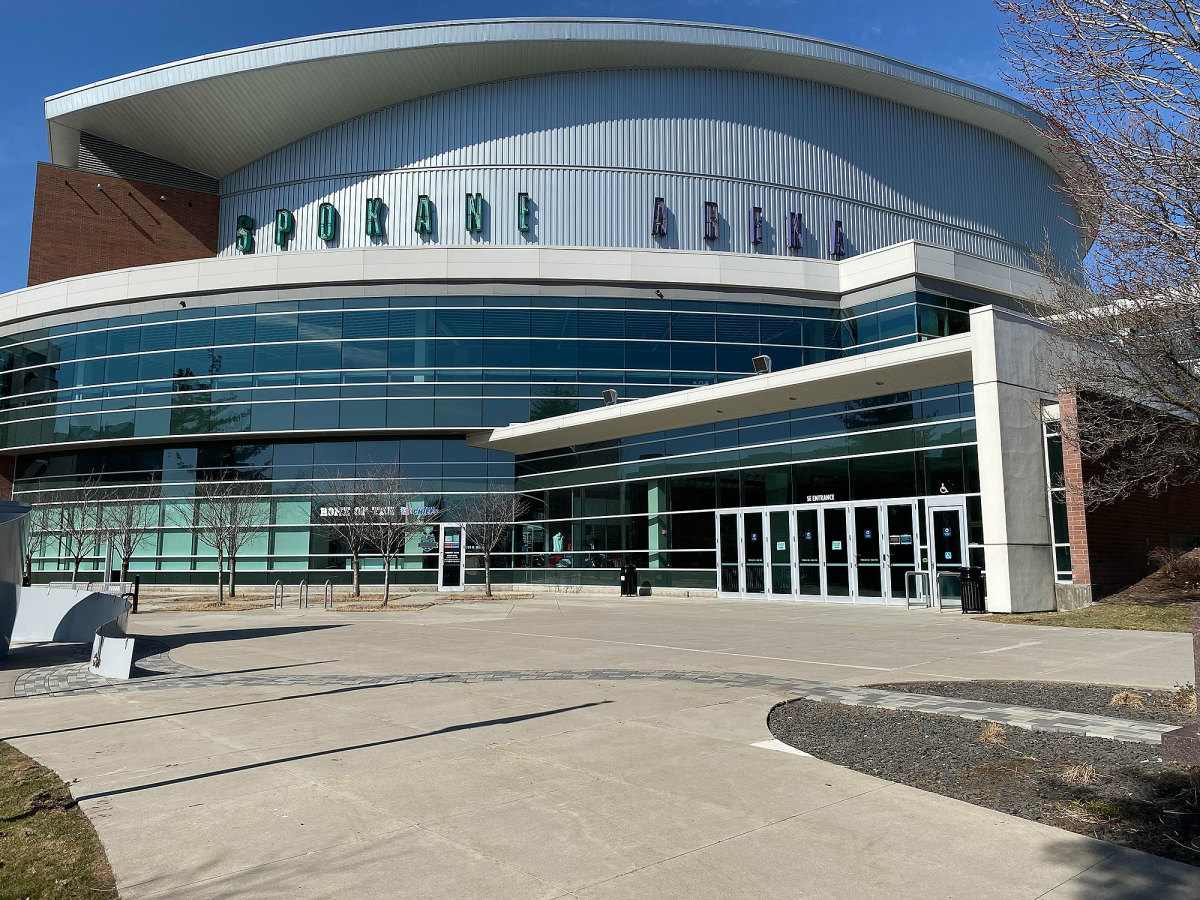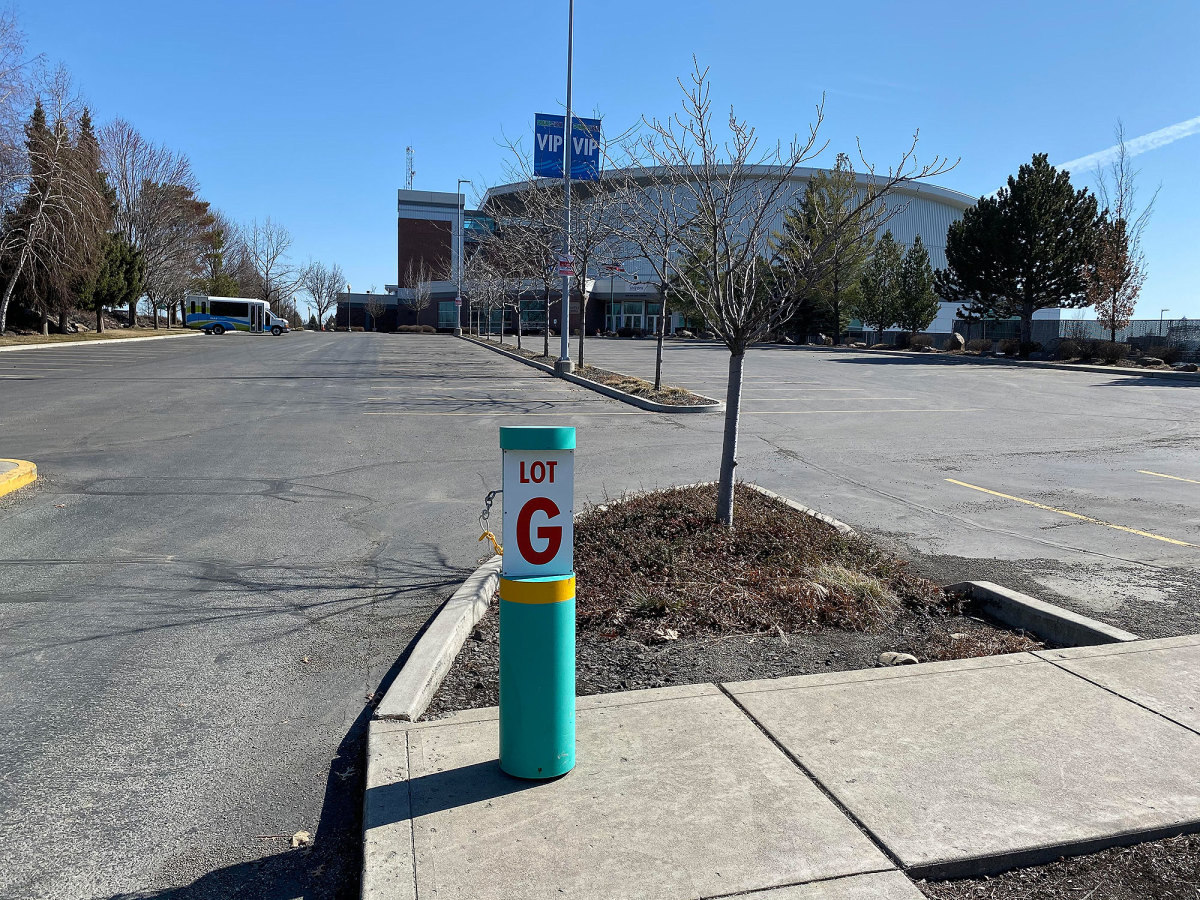An NCAA Tournament Host City Grapples With the Impact of a Lost March Madness
SPOKANE, Wash. — On Thursday, inside the arena where sneakers were supposed to squeak and crowds were supposed to chant and bands were supposed to play, there was silence. The few souls who stopped in briefly could hear a broom sweep and the ventilation system hum. The basketball court that would have featured eight NCAA tournament teams and more than 12,000 fans per session had never been laid down; instead, the floor had been stripped to its base layer of concrete.
“It’s very sad,” whispered Stephanie Curran, CEO of the Spokane Public Facilities District, the group in charge of hosting events at the Spokane Arena and other local venues—back when there were events to host.
Curran stood next to Nadine Woodward, the mayor of this city of more than 200,000 near the Idaho border. They tried to picture what Thursday might have been like, looked like, sounded like, when March Madness tipped off in the middle of their busiest month, featuring top-seeded Gonzaga in front of a partisan crowd.
“It’s depressing,” Woodward said. “It’s hard. It’s really …”
“It shows how small the world is, right?” said Curran. “I mean, this is something that started in China in November and now, four months later, this is the impact.”
By “something,” she meant the coronavirus, the disease now known as COVID-19 that has spread all over the world, infected thousands and thrown markets, lives and industries into chaos. With almost all sports shut down indefinitely and health experts recommending things like self-quarantine and social distancing, events like those scheduled to be held in the Spokane Arena will not take place for months, if ever. All of which put people across the country like the mayor and the executive into a bind from which there is no immediate escape. Of course, they understand the need for drastic action. They’re not advocating that games should have been played. But that also doesn’t change the economic impact, which is both real and severe.

Outside of the arena, on a perfectly sunny day, the parking lots sat mostly empty. A shuttle driver idled in his bus, with a paperback cracked open. Workers performed the most thorough window cleaning imaginable. CLOSED signs hung from the windows of nearby businesses, like the wellness center and the bingo hall and numerous sports bars. Most local hotels were shuttered. Employees greeted each other not with handshakes, or even fist bumps, but with elbow taps.
“Strange times,” said Eric Sawyer, CEO of the Spokane Sports Commission. “We’re kind of ghost town-ish. Obviously, we’ve never experienced anything like this. Nobody has. I feel like I’m working in an industry that doesn’t exist anymore.”
In March most years, especially in Spokane, especially when the arena features NCAA action, everyone benefits. The hotels. The parking lots. The restaurants and bars. The organizations. The contract workers who take tickets or serve pizza or pour beers. This year could have produced the biggest haul to date, since Spokane was supposed to host a middle school basketball state tournament, the NCAAs for both the men’s and women’s brackets and a volleyball qualifying tourney. Experts estimate the economic impact in this event-less March alone will be a deficit of roughly $20 million. Organizers say they will lose at least $3.4 million just in tax revenue; the city projects a $6 million sales tax hit on its initial projection of $53 million in 2020.
That’s only March. Between the arena, the local theater and the convention center, there were almost 100 events—concerts, games, plays, conferences—scheduled through May. For now, the arena will continue to pay its roughly 50 employees. But officials can’t do anything about the contract workers with no contracts to present. They’re hoping to be running again by mid-summer, at earliest. “If there’s such a thing as good timing involved here,” said Matt Meyer, who books acts and groups for all three venues, “this couldn’t have been worse.”
****

Across the street from the arena, a sign at David’s Pizza blinked “open,” the neon at once true and misleading. Had the tournament taken place, Mark Starr would have opened the business he has owned for 24 years in the morning, catering to locals and out-of-towners, every seat taken, taps flowing, slices disappearing from greasy plates. Fans for the first session might have arrived beforehand and come back after, taking the place of supporters in town for the second session when they headed inside. Empty bar stools greeted Starr instead.
Just two weeks earlier, when the city had hosted a high school basketball tournament, Starr had banked one of his biggest earning weeks for early March. He took in so much revenue that his accountant called to make sure he had the numbers right. Just a week earlier, he had hosted the local chapter of The Friendly Sons of St. Patrick to plan out his annual St. Patrick’s Day celebration. He bought $17,000 worth of liquor and beer, much of it green. Winter was giving way to spring. The weather was improving. The Zags would dominate. The locals would head outside. “All the planets aligned perfectly,” Starr said.
Instead, he had to let go of 80% of his employees, after his sales dropped by an identical percentage. The restaurant had booked 200 reservations for the first day of the tournament, all of which had to be canceled. His catering business also took a hit, when government officials limited large gatherings, then limited them again and again and again. “It was surreal,” Starr said. “It still is.”
On St. Patrick’s Day, Curran glanced out her office window and saw Starr outside of his pizza parlor … dusting the fire alarm. He told her to come over for a drink, and she did, the restaurant empty on the first of a series of nights when it would normally have been packed. They lamented the crowds that never were.
“This all happened, everything changed,” Starr said, “in the space of a week.”
****
Arena officials had started to address the coronavirus weeks ago. They called the health department. They hung informational fliers near every bathroom and entrance. They ordered 75 additional stands for hand sanitizer, along with numerous containers, 268 cases of 1,000-sheet toilet paper, latex gloves, masks and wipes.
The local hockey team, the WHL’s Spokane Chiefs, had won 10 games in a row and qualified for the postseason, meaning extra games and extra cash. The Spokane Shock of the Indoor Football League were set to bring arena football back after a two-year hiatus, their first contest scheduled for late-March.
On Monday, March 9, the rock band Tool played a sold-out show at Spokane Arena. The Chiefs won at home, on Tuesday, March 10. Curran was worried about how to handle all the extra ticket requests from Gonzaga fans who could safely assume the Bulldogs would remain home for the tournament’s first two rounds; her venue was one of three that had sold out immediately, weeks earlier.
The following day, on March 11, the NCAA made the unprecedented decision to hold its tournament without fans, limiting attendance to teams, family members and essential personnel. For Curran, this was both a brutal and understandable scenario; the arena would have to pay the same expenses, but with almost no revenue coming in, and officials would have to figure out what to do about all the tickets that had been sold but no longer existed.
Those particular fears, though, were short-lived. The next day, on March 12, the NCAA canceled its men's and women's tournaments entirely. Everyone involved understood. These steps were necessary, aimed at the greater good. “In times like this, you want to blame somebody, but there’s nobody to blame,” Sawyer said. “You gotta do what you gotta do to make sure people are safe. Health is a lot more important than a national championship. We all know that.”
He paused, then added, “But it doesn’t make me feel any better about it.”
****

Before the NCAA halted March Madness, Gonzaga won the West Coast Conference tournament that Tuesday in Las Vegas, topping Saint Mary’s in a resounding 84-66 win. The Zags were ranked second in the country, had just decimated another tourney team on a neutral floor and were gearing up for essentially two home games to begin another pursuit of their first-ever national championship.
The Zags coach, Mark Few, gave his players a few days off to rest. He was home one night, watching his competitors on television, when he told his wife and oldest son that he had a bad feeling. That he could see the NCAA might cancel the tournament. “They looked at me like I was crazy,” Few says.
Then he saw that Utah Jazz center Rudy Gobert had tested positive for the coronavirus and what had once seemed possible now started to feel certain. He hoped the NCAA would postpone its tournament, try again in May or June, and then cancel if need be. In subsequent conversations, like the one Few had with NCAA president Mark Emmert, he found out that the organization had exhausted all its options. “They were left with no choice,” Few said. “They were reading all the data in front of them, and the predictions were pretty grim, and everything was changing drastically on an hour-to-hour basis.”
Few didn’t know anyone who had been personally affected, but he understood the magnitude involved. He also had a hunch. “I know people don’t want to hear this,” Few said. “But my theory is a bunch of us have already had (the virus). I saw a good amount of people who had a high fever and some pretty serious upper respiratory problems.”
Ultimately, he understood, even though the decision scuttled the first time that the Gonzaga men’s and women’s basketball teams would have played in NCAA tournament games in Spokane in the same season. The Gonzaga women were likely to have hosted a four-team pod at the McCarthey Athletic Center.
Few met with his players on that Thursday afternoon when March Madness had officially been shelved. He saw tears, anger and disappointment in the young eyes that stared back at him. He heard sobs. He heard silence. The scene, he said, resembled a Gonzaga locker room after a loss in the actual tournament. Few told his players to control what they could control, that it wasn’t their fault, that he ached for them. In some ways, his words felt empty. “But again, it just pales in comparison to what’s happening right now,” he said. “It doesn’t compare to a family that can’t pay its rent. God, wow. The least of my worries now is how disappointed we all were with the basketball.”
Few spent the last week trying to help his players, particularly the Zags international contingent that lives so far away from home. Who knew that the big win in Vegas would be their final game this season? Or that SportsLine.com would simulate the tournament, and in that simulation, Gonzaga would reach the championship game, losing to Dayton. Few had watched the college basketball season unfold, and he felt like “five or six” teams “really had a legit national champion look to them.”
“Golly, we were really in position to make a serious run, too,” he said. “How many opportunities like that do you really get?”
****

On Thursday, at about the same time the NCAA tournament might have tipped off, Starr left the pizza restaurant across from the arena and drove his bright red catering truck to police stations and fire departments. The overworked officers and firemen needed pizza, he reasoned, and he needed to rid his shelves of their ingredients before they spoiled. A piece of equipment fell on his head, opening a gash. But Starr refused to be deterred. He needed to do something, anything. Why? “It’s Spokane,” he said.
In the absence of games, normalcy and most human interaction, local politicians, business owners and residents have tried to get creative. The mayor’s office started an #orderupspokane campaign, attempting to drive business to restaurants via delivery and takeout. Dry Fly Distilling started to produce hand sanitizer rather than wheat vodka.
Officials for the various arena or sports groups considered contingency plans, drew up business recovery proposals, or assigned projects that had been backburner-ed for real events. They merged a marketing office that had been in two separate places. They figured out who was an essential employee and who was a non-essential one. They considered who could work from home and what they’d do. They reached out to bands and organizations and conference holders to find dates in the future where they could reschedule, rather than cancel outright. Only three groups decided not to try and find a later date. And they called local high schools and colleges to consider their graduations, which are scheduled for right about when the Centers for Disease Control or Prevention could lift its eight-week ban of large gatherings.
Still, they remained as uncertain as anybody else. “One girl sneezed out in the lobby and like five people, oh my God, they jumped,” Curran said.
“That’s the thing,” Curran added. “The unknown. We don’t know what’s going to happen.”
She’s hopeful the NCAA will recognize the bids that cities lost this spring and award them again to the same hosts in the next cycle. Starr refuses to take down his St. Patrick’s Day décor; he’ll throw a party the first day he can. He might throw one every day for a week.
As for the mayor, Woodward says of the city she’s lived in for 30 years, “We’ve grown up. These kinds of events that are canceled would have allowed us to show we’ve changed. But we’re looking ahead. We’re optimistic. We’re resilient.”
The arena’s expanse spreads in front of her, empty seats in every direction. Where there was supposed to be cacophony, there is silence, and yet, despite the confusion and the virus and its spread, there is hope somewhere on the horizon, too.
